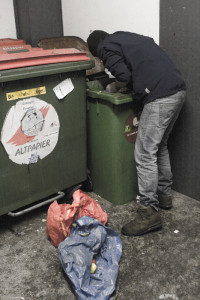 In Houston, Texas, you can get a $500 ticket for feeding a homeless person. Or, if you’re the homeless person, you can be cited for digging through trash for food scraps (often called “dumpster diving”). Read the story here.
In Houston, Texas, you can get a $500 ticket for feeding a homeless person. Or, if you’re the homeless person, you can be cited for digging through trash for food scraps (often called “dumpster diving”). Read the story here.
America has a long history of criminalizing poverty, starting with the “Black Codes” enacted in the South after the Civil War to force freed slaves into forced labor. So-called vagrancy laws were common throughout the United States until the Supreme Court struck them down in 1972. Since then, many cities have tried to avoid constitutional objections against such laws by making them more specific, e.g., targeting aggressive panhandling and sitting on sidewalks (so-called “sit-lie” ordinances).
The latest permutation of hate-the-poor legislation is the feeding bans enacted by Houston and several Florida municipalities, including Orlando. These ordinances, which generally are being upheld by courts, have sparked protests by groups like Occupy Wall Street and civil disobedience by groups like Food Not Bombs (founded in Massachusetts in 1980 by an anti-nuclear activist).
Frequently the aim of such ordinances is to push street people out of cities into neighboring communities. How would you like such a city as a neighbor?
Meanwhile, Rep. Paul Ryan (R-WI), who’s being recruited by many Republican House members to take the Speaker’s chair being vacated by John Boehner and declined by Rep. Kevin McCarthy, thinks the solution to poverty is eviscerating anti-poverty programs. He recently said on a radio program,
“We have got this tailspin of culture, in our inner cities in particular, of men not working and just generations of men not even thinking about working or learning to value the culture of work, so there is a real culture problem here that has to be dealt with.”
This, of course, is standard Republican dog-whistle fare — i.e., people are poor because they’re “lazy” and “don’t want to work,” and that poverty and personal moral failings go hand-in-hand, not because jobs are nonexistent or don’t pay enough to live on. And “inner city,” of course, means “black.” Read that story here.
I don’t know about you, but these aren’t the kinds of values I can support or vote for.
If you use a photos, please credit the photographer.
Even photos from Wikipedia require that CC-BY 3.0
Attribution — You must give appropriate credit, provide a link to the license, and indicate if changes were made. You may do so in any reasonable manner, but not in any way that suggests the licensor endorses you or your use.
I have no idea who you are but I suggest you read up on fair,use.
The photographer can’t sue us anyway. The statute of limitations has expired.